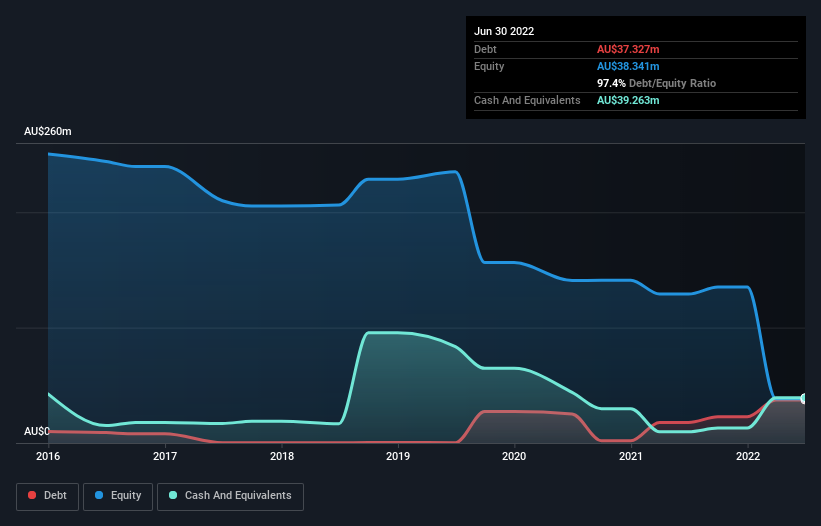
Howard Marks put it nicely when he said that, rather than worrying about share price volatility, 'The possibility of permanent loss is the risk I worry about... and every practical investor I know worries about.' It's only natural to consider a company's balance sheet when you examine how risky it is, since debt is often involved when a business collapses. As with many other companies Decmil Group Limited (ASX:DCG) makes use of debt. But the more important question is: how much risk is that debt creating?
When Is Debt Dangerous?
Debt and other liabilities become risky for a business when it cannot easily fulfill those obligations, either with free cash flow or by raising capital at an attractive price. If things get really bad, the lenders can take control of the business. While that is not too common, we often do see indebted companies permanently diluting shareholders because lenders force them to raise capital at a distressed price. By replacing dilution, though, debt can be an extremely good tool for businesses that need capital to invest in growth at high rates of return. The first thing to do when considering how much debt a business uses is to look at its cash and debt together.
View our latest analysis for Decmil Group
What Is Decmil Group's Net Debt?
As you can see below, at the end of June 2022, Decmil Group had AU$37.3m of debt, up from AU$17.8m a year ago. Click the image for more detail. But on the other hand it also has AU$39.3m in cash, leading to a AU$1.94m net cash position.

A Look At Decmil Group's Liabilities
According to the last reported balance sheet, Decmil Group had liabilities of AU$143.8m due within 12 months, and liabilities of AU$42.2m due beyond 12 months. Offsetting these obligations, it had cash of AU$39.3m as well as receivables valued at AU$53.4m due within 12 months. So its liabilities outweigh the sum of its cash and (near-term) receivables by AU$93.3m.
This deficit casts a shadow over the AU$31.1m company, like a colossus towering over mere mortals. So we'd watch its balance sheet closely, without a doubt. At the end of the day, Decmil Group would probably need a major re-capitalization if its creditors were to demand repayment. Given that Decmil Group has more cash than debt, we're pretty confident it can handle its debt, despite the fact that it has a lot of liabilities in total. The balance sheet is clearly the area to focus on when you are analysing debt. But ultimately the future profitability of the business will decide if Decmil Group can strengthen its balance sheet over time. So if you want to see what the professionals think, you might find this free report on analyst profit forecasts to be interesting.
In the last year Decmil Group wasn't profitable at an EBIT level, but managed to grow its revenue by 24%, to AU$378m. With any luck the company will be able to grow its way to profitability.
So How Risky Is Decmil Group?
Although Decmil Group had an earnings before interest and tax (EBIT) loss over the last twelve months, it generated positive free cash flow of AU$4.7m. So taking that on face value, and considering the net cash situation, we don't think that the stock is too risky in the near term. One positive was the revenue growth of 24% over the last year. But the stock still looks risky to us. When analysing debt levels, the balance sheet is the obvious place to start. But ultimately, every company can contain risks that exist outside of the balance sheet. We've identified 1 warning sign with Decmil Group , and understanding them should be part of your investment process.
If, after all that, you're more interested in a fast growing company with a rock-solid balance sheet, then check out our list of net cash growth stocks without delay.
New: Manage All Your Stock Portfolios in One Place
We've created the ultimate portfolio companion for stock investors, and it's free.
• Connect an unlimited number of Portfolios and see your total in one currency
• Be alerted to new Warning Signs or Risks via email or mobile
• Track the Fair Value of your stocks
Have feedback on this article? Concerned about the content? Get in touch with us directly. Alternatively, email editorial-team (at) simplywallst.com.
This article by Simply Wall St is general in nature. We provide commentary based on historical data and analyst forecasts only using an unbiased methodology and our articles are not intended to be financial advice. It does not constitute a recommendation to buy or sell any stock, and does not take account of your objectives, or your financial situation. We aim to bring you long-term focused analysis driven by fundamental data. Note that our analysis may not factor in the latest price-sensitive company announcements or qualitative material. Simply Wall St has no position in any stocks mentioned.
About ASX:DCG
Decmil Group
Provides design, engineering, construction, and maintenance works for infrastructure, resources, energy, and construction sectors primarily in Australia.
Slight and slightly overvalued.
Similar Companies
Market Insights
Community Narratives




